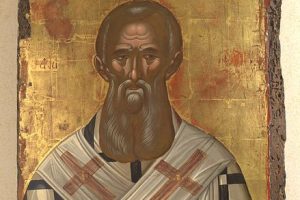
May 2, 2019
First Reading: Acts 5:27-33
27 And when they had brought them, they set them before the council. And the high priest questioned them, 28 saying, “We strictly charged you not to teach in this name, yet here you have filled Jerusalem with your teaching and you intend to bring this man’s blood upon us.” 29 But Peter and the apostles answered, “We must obey God rather than men. 30 The God of our fathers raised Jesus whom you killed by hanging him on a tree. 31 God exalted him at his right hand as Leader and Savior, to give repentance to Israel and forgiveness of sins. 32 And we are witnesses to these things, and so is the Holy Spirit whom God has given to those who obey him.” 33 When they heard this they were enraged and wanted to kill them.
Psalm: 34:2, 9, 17-20
1 I will bless the LORD at all times; his praise shall continually be in my mouth. 8 O taste and see that the LORD is good! Happy is the man who takes refuge in him! 16 The face of the LORD is against evildoers, to cut off the remembrance of them from the earth. 17 When the righteous cry for help, the LORD hears, and delivers them out of all their troubles. 18 The LORD is near to the brokenhearted, and saves the crushed in spirit. 19 Many are the afflictions of the righteous; but the LORD delivers him out of them all.
Gospel: John 3:31-36
31 He who comes from above is above all; he who is of the earth belongs to the earth, and of the earth he speaks; he who comes from heaven is above all. 32 He bears witness to what he has seen and heard, yet no one receives his testimony; 33 he who receives his testimony sets his seal to this, that God is true. 34 For he whom God has sent utters the words of God, for it is not by measure that he gives the Spirit; 35 the Father loves the Son, and has given all things into his hand. 36 He who believes in the Son has eternal life; he who does not obey the Son shall not see life, but the wrath of God rests upon him.
Reflection for the day: “He, the Life of all, our Lord and Saviour, did not arrange the manner of his own death lest He should seem to be afraid of some other kind. No. He accepted and bore upon the cross a death inflicted by others, and those other His special enemies, a death which to them was supremely terrible and by no means to be faced; and He did this in order that, by destroying even this death, He might Himself be believed to be the Life, and the power of death be recognized as finally annulled. A marvelous and mighty paradox has thus occurred, for the death which they thought to inflict on Him as dishonor and disgrace has become the glorious monument to death’s defeat.” ― St. Athanasius
 May 2, 2019
May 2, 2019

You must be logged in to post a comment.